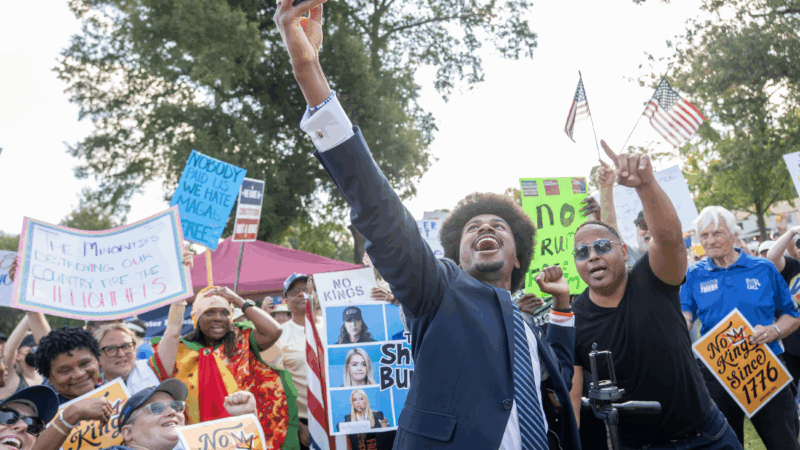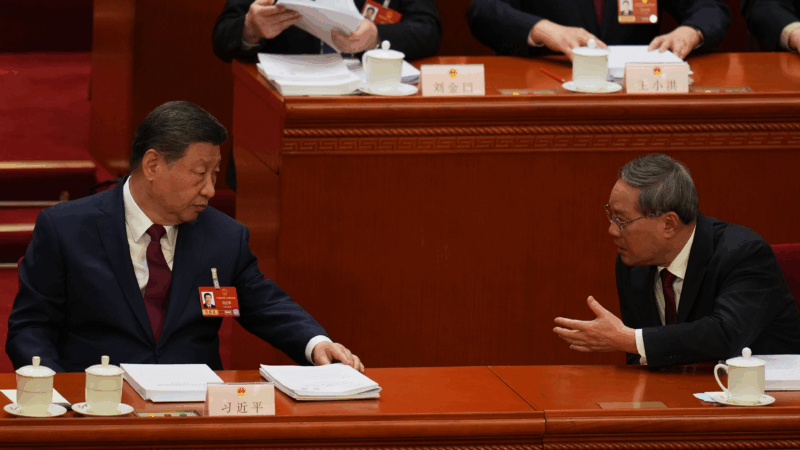Trump-appointed federal judge blocks use of Alien Enemies Act for Venezuelans in South Texas
A federal judge in Texas Thursday ruled that President Trump’s use of the Alien Enemies Act (AEA) to detain and deport Venezuelan immigrants from South Texas was “unlawful.”
U.S. District Judge Fernando Rodriguez, Jr., a Trump appointee, wrote that Trump’s invocation of the act “exceeds the scope of the statute and is contrary to the plain, ordinary meaning of the statute’s terms.”
The government, he ruled, does not “possess the lawful authority under the AEA, and based on the Proclamation, to detain Venezuelan aliens, transfer them within the United States, or remove them from the country.” The men in this Texas case have been threatened with imminent removal under the Alien Enemies Act, according to the American Civil Liberties Union. They are accused of being members of Tren de Aragua, a Venezuelan gang. They remain in detention at El Valle Detention Center in Raymondville, Texas.
The judge’s decision covers all of the Southern District of Texas, which includes Brownsville, McAllen and Houston.
Other courts have sought to block the Trump administration from deporting anyone under the act. But this is the first time a judge has ruled that the act cannot be used against people who are alleged gang members invading the United States.
“The court ruled the president can’t unilaterally declare an invasion of the United States and invoke a wartime authority during peacetime,” Lee Gelernt, an attorney with the American Civil Liberties Union and lead counsel for the three Venezuelan plaintiffs, said in a statement. “This is a critically important decision that prevents more people from being sent to the notorious CECOT prison (a maximum security prison in El Salvador).”
After extensive analysis of historical records, Judge Rodriguez concluded in his ruling that the ordinary meaning of “invasion” or “predatory inclusion” when the Alien Enemies Act was enacted required a military incursion. He found that the criminal activities of Tren de Aragua members described in the Proclamation, while harmful, did not constitute an “invasion” or “predatory incursion” as understood under the Act.
“The Proclamation makes no reference to and in no manner suggests that a threat exists of an organized, armed group of individuals entering the United States at the direction of Venezuela to conquer the country or assume control over a portion of the nation,” Judge Rodriguez wrote.
“Thus, while the Court finds that an ‘invasion’ or ‘predatory incursion’ must involve an organized, armed force entering the United States to engage in conduct destructive of property and human life in a specific geographical area, the action need not be a precursor to actual war.”
The Department of Homeland Security didn’t immediately reply to a request for comment. If the Trump administration appeals the decision, it would go to the 5th U.S. Circuit Court of appeals, considered one of country’s most conservative courts. The case could eventually be headed to the U.S. Supreme Court.
President Trump issued a proclamation in March accusing Tren de Aragua of “perpetrating, attempting, and threatening an invasion or predatory incursion against the territory of the United States.”
“(Tren de Aragua) is undertaking hostile actions and conducting irregular warfare against the territory of the United States both directly and at the direction, clandestine or otherwise, of the Maduro regime in Venezuela,” Trump wrote in his proclamation.
Trump has used the Act to remove more than 130 Venezuelan men to a maximum security prison in El Salvador. The administration has accused all of them of being Tren de Aragua, but has conceded not all of them have criminal records.
The Texas suit is one of several court cases on the topic sparked by Trump’s proclamation and his administration’s actions.
In late March, a three-judge panel from the U.S. Court of Appeals for the D.C. Circuit upheld a ruling by federal Judge James Boasberg and denied the White House’s use of the wartime authority by a vote of 2 to 1. Judge Patricia Millett, an appointee of former President Barack Obama, cited a lack of opportunity for the alleged gang members to contest the cases.
“The government’s removal scheme denies Plaintiffs even a gossamer thread of due process,” Millett wrote in a concurring statement.
The Supreme Court has already ruled the Trump administration can remove migrants under the Alien Enemies Act, but with a caveat. Migrants alleged to be gang members must be given “reasonable time” to challenge their removal from the country. The high court did not specify a length of time.
Wall Street is betting on tariff refunds after Supreme Court ruling
When the Supreme Court struck down many of President Trump's tariffs, it left importers wondering how long they'd have to wait to get their money back. Hedge funds are offering to help out.
Announcing the 2025 NPR College Podcast Challenge Honorable Mentions
Here are some of the best entries in NPR's 2025 College Podcast Challenge.
When ICE came, Minneapolis created underground health networks. Should other cities?
The Trump administration's immigration crackdown in Minneapolis forced some families into hiding and catalyzed informal medical networks to deliver critical health care services inside homes.
A run for their money: Young candidates rival older incumbents in midterm fundraising
As a growing crop of young candidates challenge longtime Democratic incumbents, some are not just breaking through in the money race, but outraising their opponents altogether.
China sets a lower economic growth target of 4.5% to 5% for 2026 as challenges loom
China has signaled continuity rather than change for its economy, setting a slightly lower target for growth this year in the midst of a property slump and other headwinds at home and growing uncertainty abroad.
Carney says he backs strikes on Iran ‘with some regret’ as world order frays
Canadian Prime Minister Mark Carney says he supports the strikes on Iran "with some regret" as they represent an extreme example of a rupturing world order.







